‘To Help Make the World More Sustainable, Fair, and Humane’
The BRICS International School: New Generation has concluded at HSE University, bringing together more than 100 participants from 38 BRICS and Global South countries. The attendees included early-career researchers, diplomats, entrepreneurs, journalists, and civil society representatives.
The BRICS International School: New Generation is one of the leading international educational initiatives for young leaders focused on global development and cooperation within the BRICS framework. Held annually with the support of the Russian Ministry of Foreign Affairs, its intellectual and organisational hub is the BRICS Expert Council–Russia, based at HSE University. This partnership ensures strong academic expertise and systematic support for training the next generation of BRICS specialists.
This year, the BRICS International School took place from October 28 to November 1 as part of the Priority 2030 programme, in partnership with the Alexander Gorchakov Public Diplomacy Fund and MGIMO University.
Following tradition, participants met on the first day with Russia’s Deputy Foreign Minister and BRICS Sherpa, Sergey Ryabkov. He noted that the BRICS International School holds a special place among youth cooperation formats. In his view, the participation of young professionals, researchers, and journalists in such initiatives contributes to the development of the humanitarian dimension of cooperation and helps nurture ‘a new generation of thinkers and practitioners’ capable of working effectively in a multipolar world.
The official opening ceremony of the BRICS International School took place on October 29 at the HSE Cultural Centre. Victoria Panova, HSE Vice Rector, Head of the BRICS Expert Council–Russia, and Russia’s Sherpa to the Women’s Twenty (W20), delivered the welcome address.
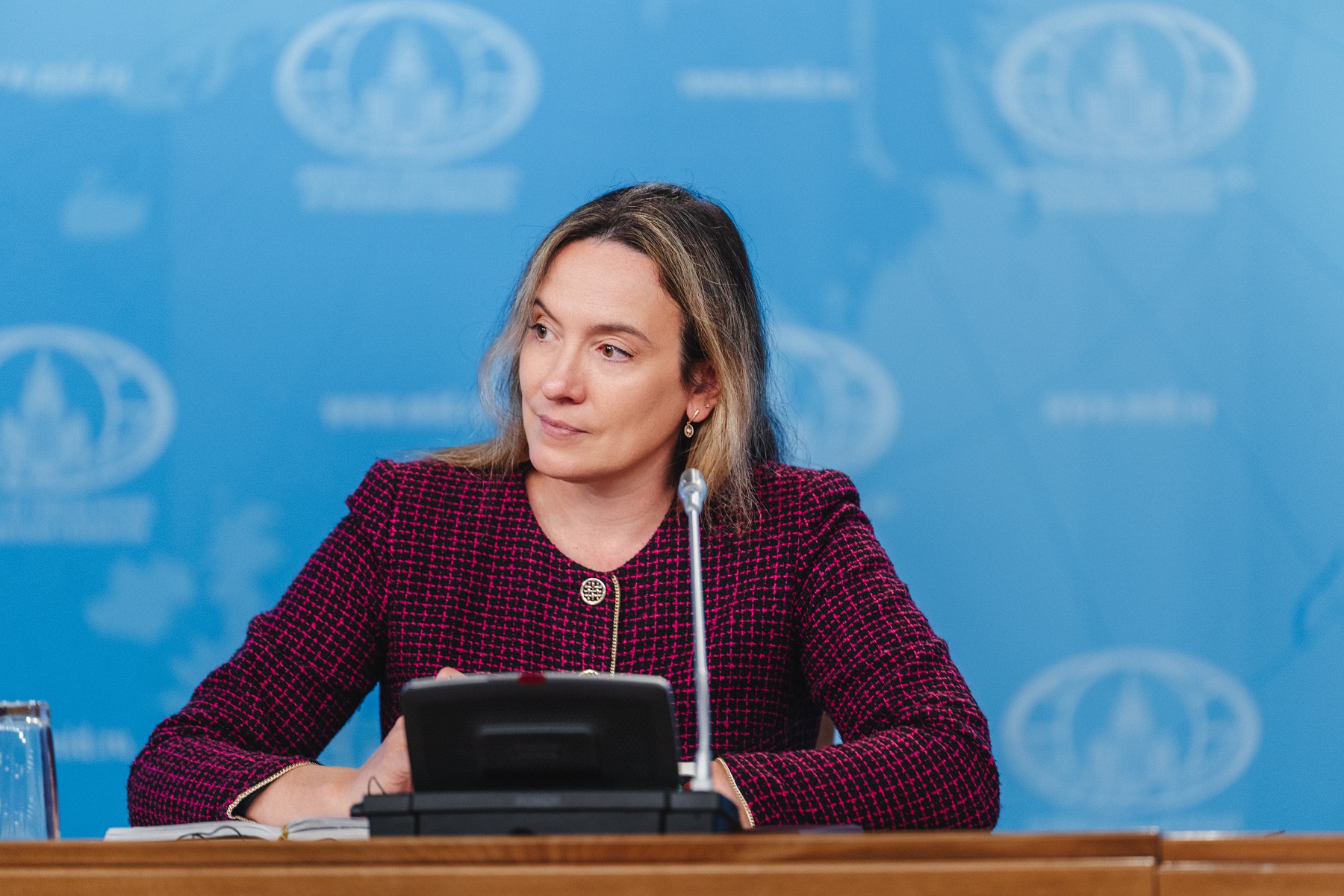
‘The BRICS International School was created as a platform for training a new generation of leaders—those ready to build communication between countries and seek balanced solutions in times of global change. Your generation faces a challenging yet inspiring task: to help make the world more sustainable, fair, and humane. The correct solutions are not always obvious, which is why we need people who think creatively, who can listen, unite, and inspire others. Openness, creativity, mutual respect, and readiness for honest dialogue—these are the values we foster within the BRICS International School: New Generation,’ said Victoria Panova.
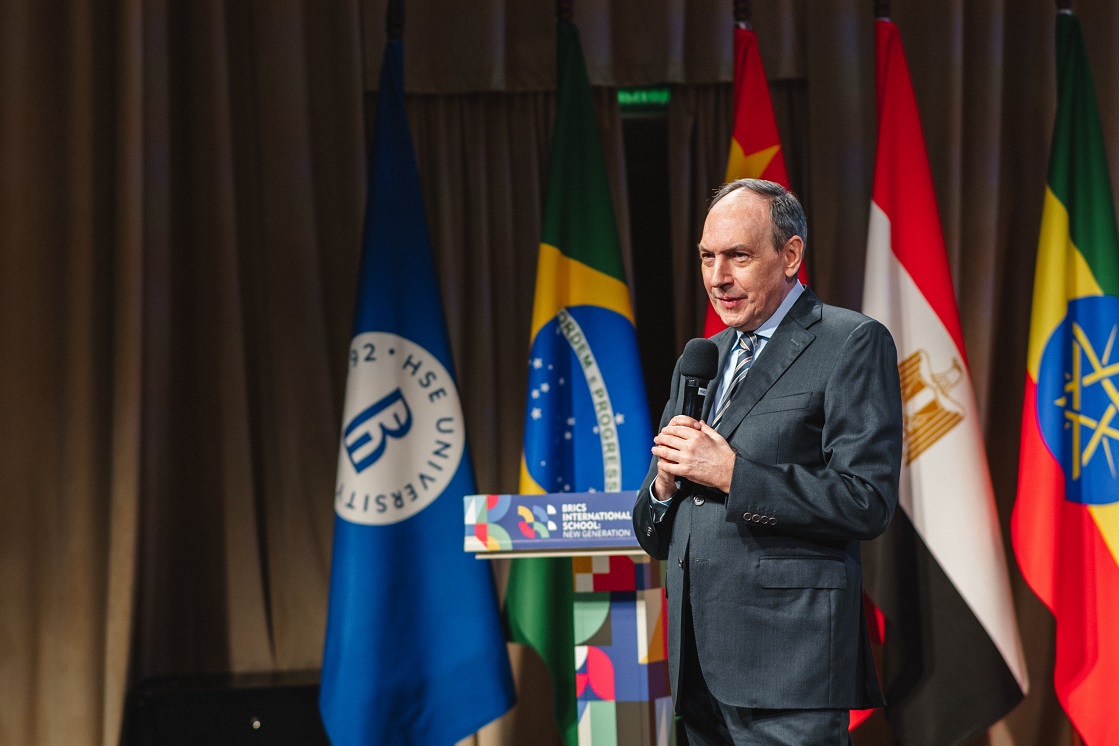
The honorary guest of the opening ceremony was Vyacheslav Nikonov, First Deputy Chairman of the State Duma Committee on International Affairs. ‘BRICS is about the future. The principles of this association reflect what relations between countries and people should be like: without confrontation, without domination, and with respect for each other. The world extends much further than the West, and the very idea of BRICS is, essentially, a turning of the globe—a way of seeing the world through the eyes of the majority,’ he emphasised.
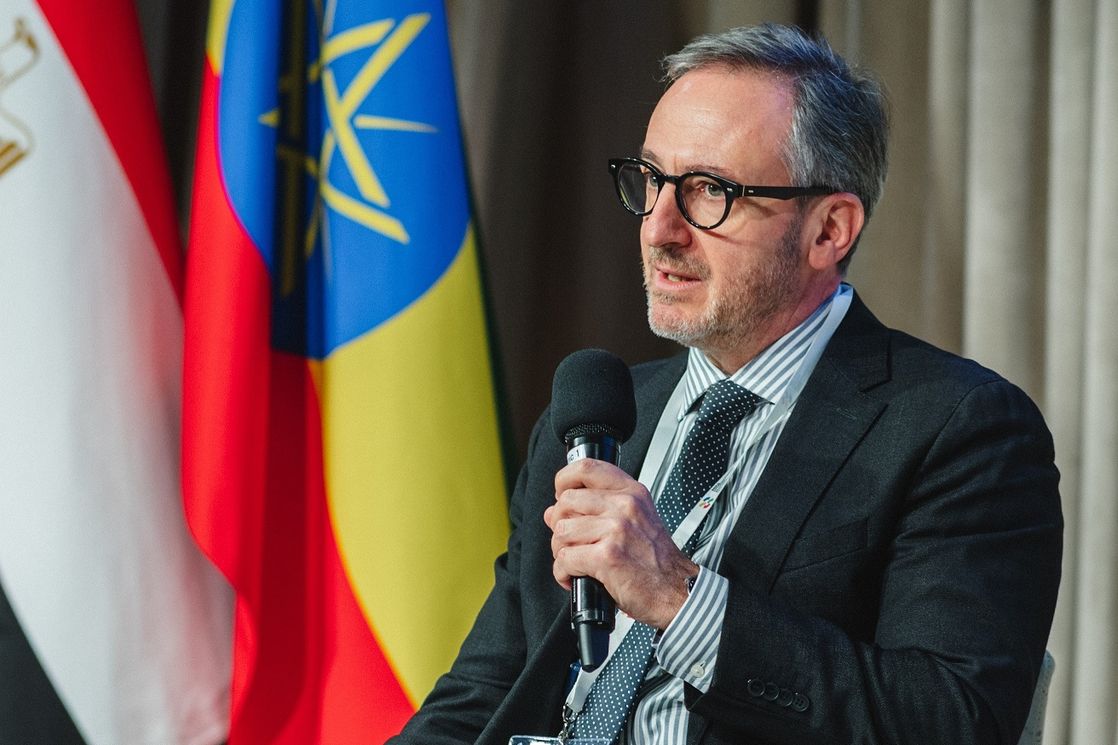
Another distinguished guest—Sérgio Rodrigues dos Santos, Ambassador Extraordinary and Plenipotentiary of the Federative Republic of Brazil—delivered a lecture titled ‘The Role of Latin America in the Modern System of International Relations: The Legacy of Brazil’s BRICS Chairship.’
From 29 to 31 October, participants of the BRICS International School took part in a diverse programme of lectures, seminars, workshops, TED Talk, expert interviews, brainstorming sessions, and a guided tour of HSE University’s Pokrovsky Bulvar campus.
HSE University faculty members were actively involved in the School’s work, including Fyodor Lukyanov, Research Professor at the Faculty of World Economy and International Affairs; Dmitri Trenin, Director of the Institute for Global Military Economics and Strategy; Dmitry Suslov, Deputy Director of the Centre for Comprehensive European and International Studies; Oleg Dmitriev, Deputy Director of the Institute of Media; and Anna Podpryatova, Director for Marketing Communications.
The final event of the BRICS International School was a tour of Moscow.
Participants shared their impressions with the HSE News Service.
Ali Mohamed, Egypt
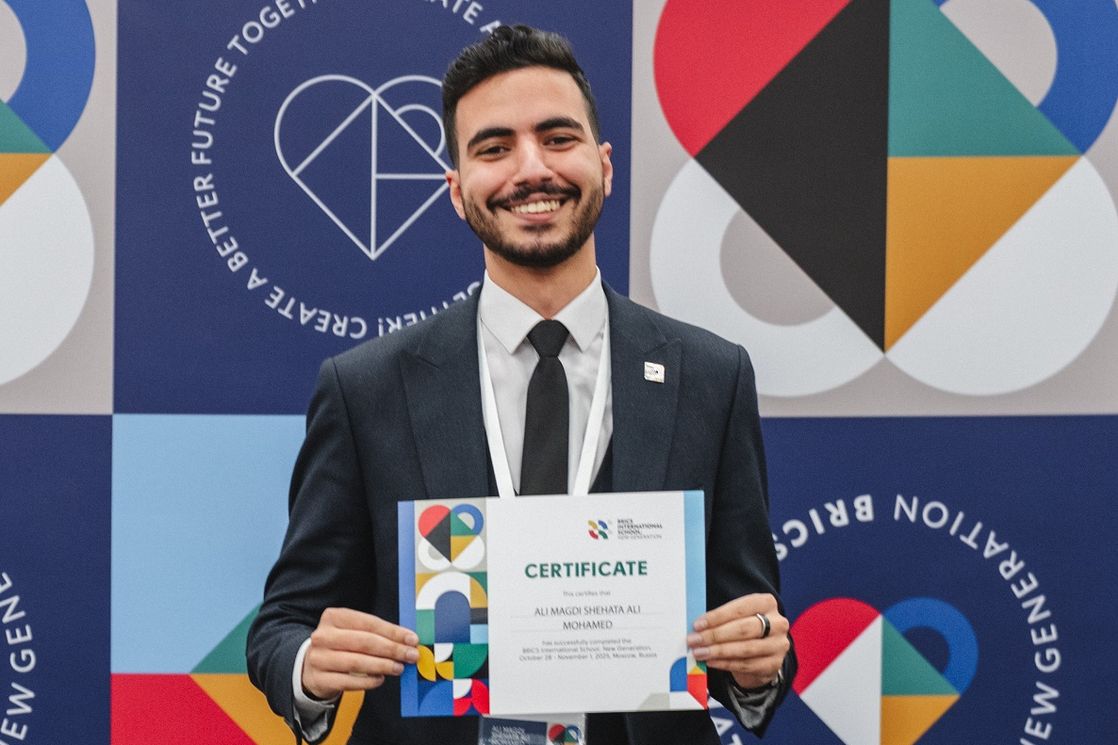
— It was an honour to take part in the BRICS International School for the second time. Once again, I was deeply impressed; the organisation was flawless, and the team was incredibly kind and responsive. I am sure this experience will be a springboard for my career. Thanks to the programme, I not only made friends from different countries but also had the chance to discuss current international issues with them—something that will undoubtedly be useful in the future.
Mohammad Ramin Hakimy, Afghanistan
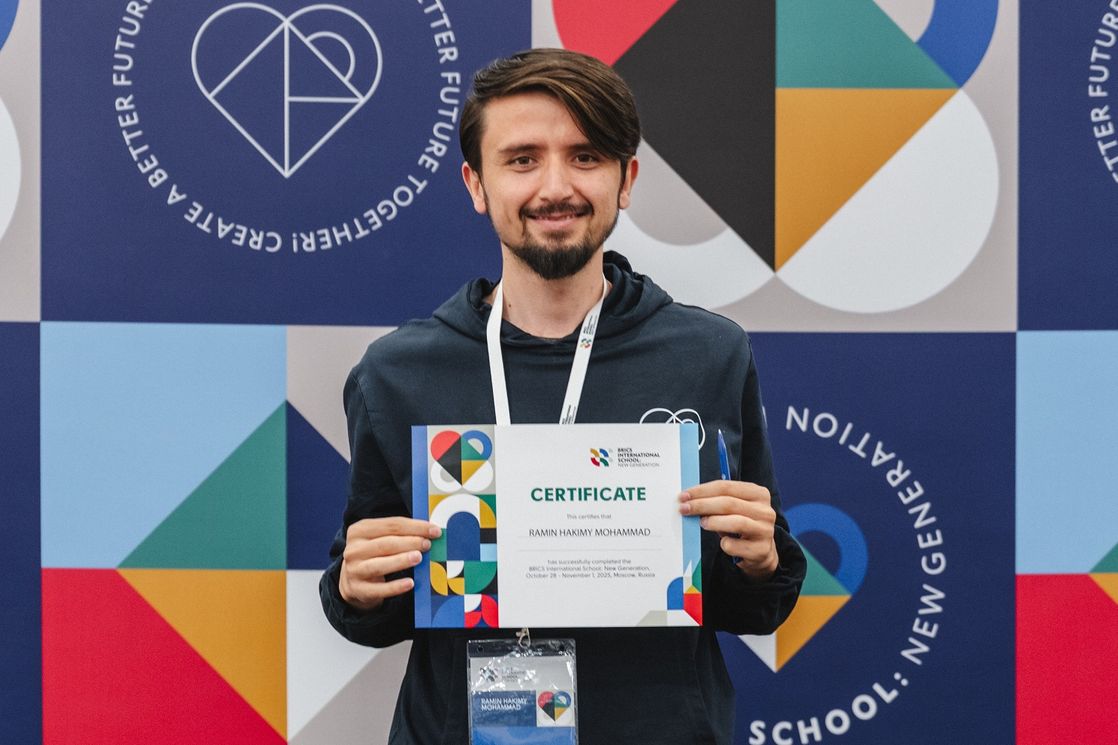
— Taking part in the BRICS International School was an invaluable experience for me. As a future diplomat studying international law, I am grateful for the opportunity to learn from leading experts and communicate with colleagues from more than 30 countries. Although Afghanistan is not yet a member of BRICS, we hope this will change. I am convinced that such programmes are extremely important for strengthening cooperation between our countries.
Indra Enkh-Amgalan, Mongolia
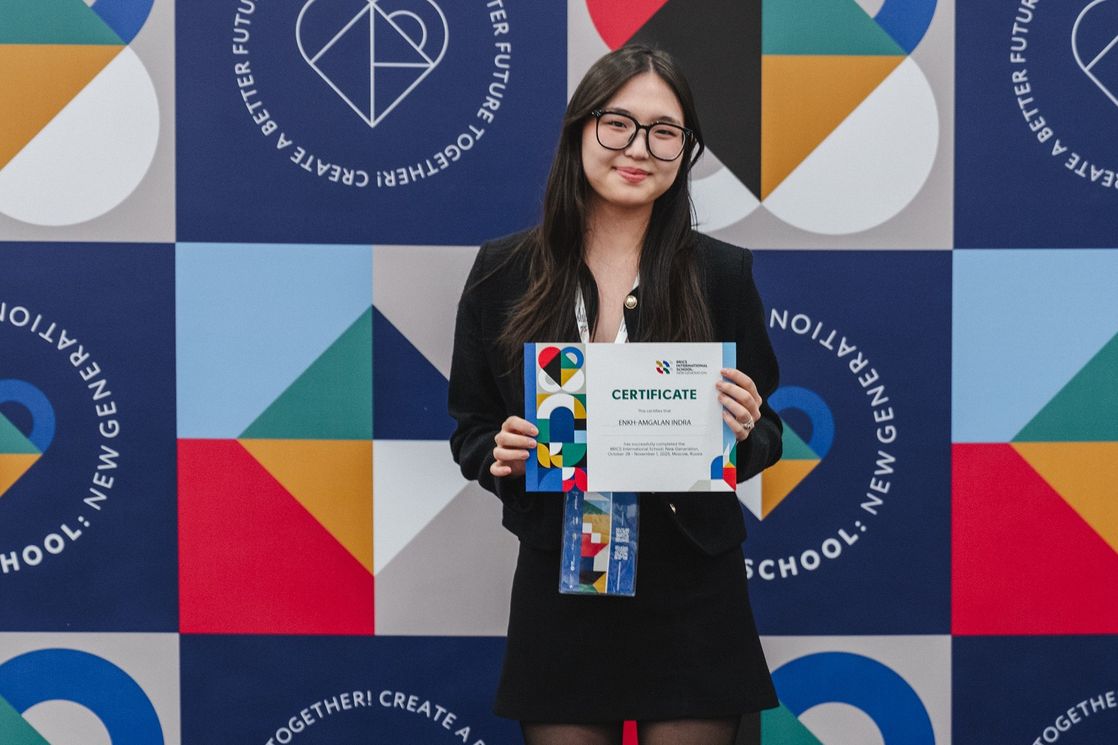
— Meeting future colleagues from different countries at the BRICS International School broadened my professional horizons. I especially cherish the memories of discovering Russian cuisine. Shared lunches became an informal space for sincere discussions with bright and original participants. I am genuinely grateful to the organisers for the carefully selected speakers—their unique methods, personal stories, and depth of expertise created a truly special educational environment.
Sung Panhapich, Cambodia

— No one from my country had ever taken part in the BRICS International School before, so it was a great honour for me to represent Cambodia here. The School left me with many wonderful impressions—the renowned speakers and professors from leading Russian universities were excellent. I learnt a lot from them and had the chance to observe their teaching methods. Moreover, I met many amazing students from different countries; we became friends and exchanged contacts. The School will undoubtedly have a lasting impact on my future.
See also:
‘Regulators Must Understand That Absolute Predictability is Unattainable’
On October 10–11, 2025, the BRICS Competition Law and Policy Centre at HSE University (the BRICS Centre) hosted a two-day international seminar, ‘Platform Economy: Competition Law and the Market Power of Digital Platforms,’ in Tashkent, Uzbekistan. The event brought together competition authorities from BRICS+ nations and leading antitrust experts from around the world.
Achieving Financial Independence: Experts Discuss Development of BRICS National Currency Settlements
How can BRICS countries move away from the dollar in international settlements, and what can they do to advance this goal today? These questions were discussed by experts during a round table at HSE University. The event was organised by the Multilateral Strategic Projects Office together with the HSE Faculty of World Economy and International Affairs as part of HSE’s activities within the BRICS Network University and the Joint Basic Research Projects ‘International Academic Cooperation of HSE University.’
Experts from HSE University and BRICS Anti-Monopoly Authorities Analyse Global Grain Market
The International BRICS Competition Law and Policy Centre at HSE University presented the scientific report ‘From Fields to Futures: Competition, Financialisation, and Digitalisation in Global Grain Value Chains.’ The document was prepared as part of expert support from the BRICS Working Group on Competition Research in Food Markets. The presentation took place at the academic conference ‘Emerging Challenges of Competition Law and Policy in the BRICS and Beyond’ on September 12, 2025, in Cape Town (South Africa), which the BRICS Centre organised together with the University of Cape Town on the sidelines of the 9th BRICS International Competition Conference.
HSE Launches Training for Future BRICS Experts
From August 20–23, 2025, the Artek International Children’s Centre (Crimea, Russia) hosted an off-site session of HSE University’s educational and outreach project BRICS International School: New Generation. The school was the first event to take place under the cooperation agreement signed this year between HSE University and Artek.
HSE University and University of Campinas Join Forces to Build Alternative Financial System
HSE University and the University of Campinas (UNICAMP, Brazil) have announced the launch of a major joint research project to develop new approaches to an alternative international financial system. The initiative, which brings together leading experts in global economics and finance, seeks to analyse the current state of international financial architecture and explore ways of transforming it in the context of a changing geopolitical landscape.
Through Heat and Sand: Egyptology Students’ Fieldwork in Egyptian Museums and Necropolises
Students of the Bachelor’s in Egyptology at the Institute for Oriental and Classical Studies, HSE Faculty of Humanities, spent ten days in the extreme conditions of the Egyptian heat exploring ancient tombs, creating 3D models of reliefs, and mastering Egyptology not from textbooks but through direct engagement with monuments.
HSE University to Host BRICS International School: New Generation
Registration for the BRICS International School: New Generation, one of the leading international educational projects aimed at prospective leaders interested in the agenda of global development and cooperation within the framework of BRICS, has opened.
Experts Assess How BRICS Countries’ Education Systems Are Evolving
The BRICS Expert Council–Russia, based at HSE University and operating in collaboration with the HSE Institute of Education, has released an analytical report titled ‘The Transformation of General Education in BRICS Countries.’ The study explores how BRICS nations are addressing shared challenges, including equitable access to schooling, digital integration, support for inclusion, linguistic diversity, and intercultural dialogue.
‘Artificial Intelligence Has Become the Lifeblood of the Global Economy’
Experts from HSE University took part in the BRICS Academic Forum (FABRICS) held in the capital of Brazil this year. The main theme of the event was to discuss cooperation among countries in the Global South amid geopolitical turbulence and rapid technological change. Academics and experts from BRICS member states and partner nations explored topics such as global healthcare, AI technologies, trade, climate change, and reform of the multilateral global security and governance architecture.
Roundtable on Russia–China Cooperation in Antimonopoly Policy Held at HSE University
HSE University hosted a roundtable titled ‘New Challenges for Antitrust Regulation: The Chinese Perspective.’ The event was organised by the International BRICS Competition Law and Policy Centre (BRICS Centre). Special guests included Chinese colleagues from the Competition Policy and Assessment Centre (CPAC) of the State Administration for Market Regulation of the People’s Republic of China (SAMR). Last year, the BRICS Centre and CPAC SAMR signed an agreement on strategic cooperation.


